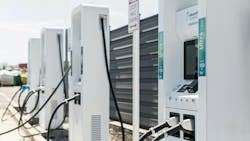While the competition among alternative fuels is fierce, hydrogen has emerged as a strong—yet often underappreciated—contender. Despite its potential, hydrogen has been somewhat sidelined in the race toward net-zero emissions, overshadowed by the rapid adoption of electric vehicles.
In 2021, registered light-duty EVs in the U.S. soared to 2.13 million, a significant increase from less than 100,000 in 2012. Still, the hydrogen market is set for growth. “The global hydrogen market in terms of revenue was estimated to be worth $242.7 billion in 2023 and is poised to reach $410.6 billion by 2030, growing at a CAGR of 7.8%,” according to Markets and Markets.
The surge in EVs on the road over the past decade has brought to light several issues that warrant either correction or an alternative option, including severe range reduction in cold climates, insufficient charging infrastructure (in addition to the increased targeting of charging stations for copper wire theft), and rising energy costs. These challenges suggest a need to broaden the zero-emission fuels focus and explore complementary solutions, such as hydrogen.
Why hydrogen?
Hydrogen, which saw significant interest in the past, is now experiencing a resurgence. According to Hydrogen Insight, “the number of hydrogen fuel cell electric vehicles on the world’s roads increased by 40% in 2022, compared to 2021, totaling more than 72,000 vehicles.” Although that’s still far behind the number of lithium-ion, battery-powered EVs, it provides a basis for useful data collection and analysis—especially around performance.
See also: Can hydrogen actually work for trucking operations?
The International Renewable Energy Agency states that “while energy efficiency, electrification, and renewables can achieve 70% of the mitigation needed, hydrogen will be needed to decarbonize end uses where other options are less mature or more costly, such as heavy industry, long-haul transport, and seasonal energy storage.”
Additionally, hydrogen is often perceived as a safe fuel for vehicles. Modern hydrogen storage tanks are designed to withstand significant impacts; extensive experience in handling hydrogen safely reinforces this perception. Toyota, for instance, has been developing its hydrogen tank design since 2000, ensuring safety is on par with other fuels.
Hydrogen production and benefits
There are two primary methods of utilizing hydrogen as a vehicle fuel: hydrogen combustion engines and the aforementioned FCEVs. HCEs operate similarly to conventional fuel combustion engines, with components like engine blocks and ignition systems. On the other hand, FCEVs generate electricity through an electrochemical reaction between hydrogen and oxygen, powering an electric motor and emitting only water vapor.
Hydrogen offers several benefits, including price and range. While the cost of hydrogen fuel is comparable to gasoline, some hydrogen vehicles can travel more than 300 miles on a full tank, with a fuel economy around 70 miles per gasoline gallon equivalent. Furthermore, hydrogen production costs have steadily decreased, making it more competitive.
See also: Where alt-fuel infrastructure stands today: hydrogen, RD and biodiesel, and natural gas
On the environmental front, hydrogen shines as a clean fuel. When used in fuel cells, it produces no greenhouse gases or harmful emissions—only water vapor. However, the environmental impact of hydrogen production depends on the methods used. Currently, a significant portion of hydrogen is produced from fossil fuels, resulting in substantial CO2 emissions. Cleaner production methods, such as combining fossil fuel-based hydrogen production with carbon capture and storage or using renewable energy for water electrolysis, are essential for reducing hydrogen’s carbon footprint.
Implementing hydrogen as a fuel has practical advantages at the commercial fleet level as well. Conventional internal combustion engine vehicles can be converted to run on hydrogen, often at a lower cost than converting them to battery electric. This makes hydrogen a cost-effective alternative for transitioning existing fleet assets.
Performance-wise, hydrogen vehicles offer cost-effective and expedient refueling. Both HCEs and FCEVs are generally more efficient and provide longer driving ranges than many battery-electric vehicles; however, hydrogen faces significant challenges. For instance, while hydrogen is abundant, pure hydrogen is not, and production methods can be costly. Fuel induction methods for hydrogen engines vary in capability, and infrastructure and availability are also significant hurdles. Building the necessary infrastructure for hydrogen fueling stations, though less involved than for EVs, is still in its early stages in the U.S., with most stations located in California.
How hydrogen stacks up
Comparing hydrogen with other fuels reveals interesting insights. Hydrogen vehicles cause less road wear than battery electric vehicles, which have a higher payload and, consequently, more road impact. However, as mentioned, infrastructure for hydrogen fueling stations is developing, but it still lags behind EV charging networks. While hydrogen conversion may be cheaper, upfront costs for hydrogen-manufactured vehicles are currently higher than those of EVs, though their lifetime cost of ownership, including maintenance and refueling, can be competitive.
In terms of emissions, both hydrogen and EVs offer significant reductions compared to ICE vehicles, yet hydrogen’s faster refueling times and longer driving ranges might give it an edge in widespread adoption.
Before adopting alternative fuels of any kind, fleets should benchmark their current fuel use, cost, and consumption. Fleet management software can aid in this process by automatically tracking these metrics in addition to EV charge tracking when integrated with telematics.
In the quest for zero-emission transportation, hydrogen shouldn’t be underestimated. Its environmental, cost, and performance benefits position it as a formidable competitor in reducing the fleet industry’s environmental impact while potentially helping businesses save on unnecessary expenses.
About the Author

Rachael Plant
Rachael Plant is a senior content marketing specialist at Fleetio. Her industry background spans from managing auto parts inventories to overseeing fleet-specific editorial content.
